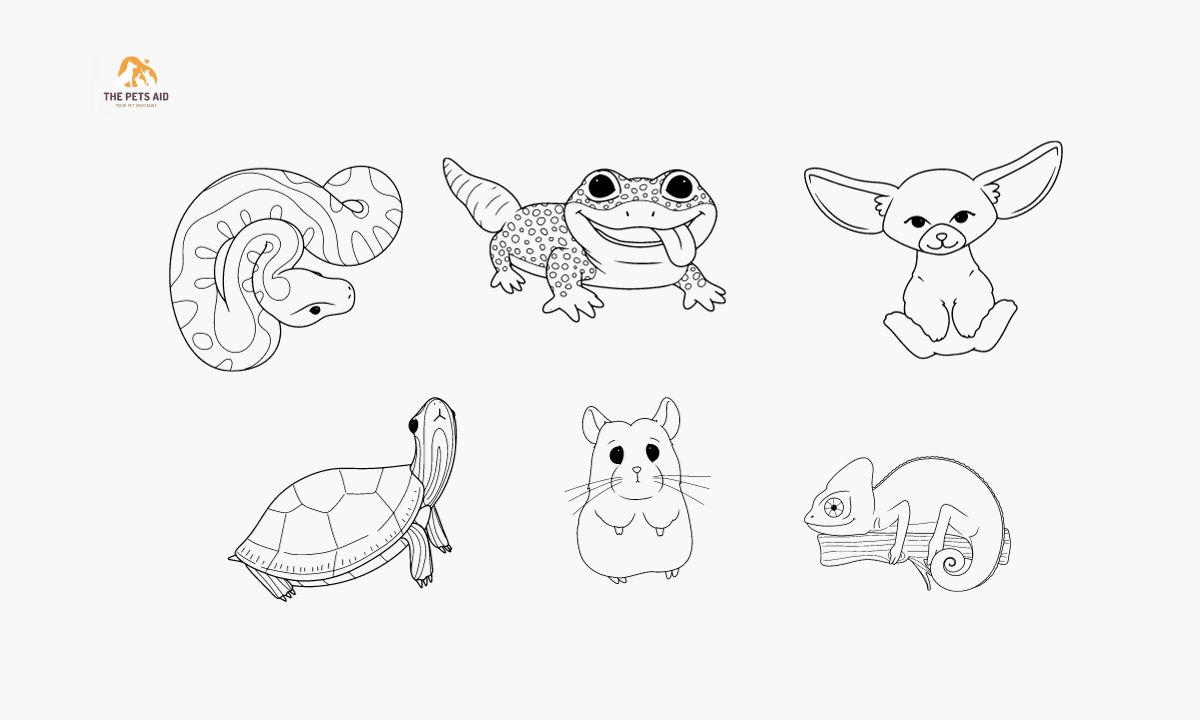Suppose you’ve been following the controversy surrounding America’s exotic pet laws. In that case, you may have come across claims that North Carolina is one of the few states with no statewide regulations on possessing exotic animals.
Animal rights organizations argue that this lack of regulation is problematic, but the reality is more nuanced than meets the eye.
Here, we’ll explore the exotic pets that are legal in North Carolina, the unique aspects of its laws, and the ongoing debates surrounding the ownership of such animals.

Highlights:
- North Carolina stands out among states for not having outright bans on larger exotic pets, allowing for the ownership of big cats, primates, and venomous snakes with minimal restrictions.
- While some states strictly regulate big cats, North Carolina permits the ownership of lions, tigers, and leopards as long as they enter the state with a health certificate.
- Regulations regarding pet foxes are unclear, with varying interpretations by different agencies. Some exotic fox species may be permitted, but the state’s laws have ambiguity.
- North Carolina is one of the few states where it is legal to own primates, including marmosets, macaques, gibbons, capuchin monkeys, and lemurs.
- The state’s lenient exotic pet laws may face changes as incidents and debates, such as the spitting cobra incident, prompt considerations for additional regulations. The future of exotic pet ownership in North Carolina remains to be determined.
The Unique Status of North Carolina
North Carolina stands out for not having outright bans on larger, more dangerous exotic animals such as big cats, bears, wolf dogs, venomous reptiles, and primates. While some states may have specific bans on certain species, North Carolina’s laws are less restrictive in comparison, allowing for a broader range of exotic pets.
1. Exotic Cats

In North Carolina, you can technically own big cats such as lions, tigers, and leopards as there are no statewide laws prohibiting the ownership of these exotic animals.
A recent study by Professor Adam Hartstone-Rose highlights the alarming effects of declawing on exotic big cats. The research reveals a startling 73% reduction in forearm muscle mass for larger species, severely impacting their crucial claw-related functions.
Additionally, declawed big cats suffer a significant 46% to 66% decline in overall forelimb strength, compromising their hunting abilities. Surprisingly, compensatory mechanisms fail to offset these losses, emphasizing the harmful consequences of declawing these majestic animals.
Big cats like lions, tigers, and leopards are technically legal in North Carolina, provided they enter the state with a health certificate. However, bobcats, mountain lions, and North American lynxes are prohibited, as they are protected native wildlife.
Smaller exotic cats, excluding bobcats, such as servals and caracals, can be kept as pets in counties that do not regulate or require permits.
2. Pet Foxes

North Carolina’s laws regarding pet foxes are somewhat ambiguous. While the state’s law technically prohibits foxes, it was initially intended to address native species like red and gray foxes. Some agencies claim that all foxes are illegal, while others permit importing exotic species such as fennec and bat-eared foxes.
3. Primates

Yes, you can own certain types of monkeys like capuchin and marmoset monkeys in North Carolina, but you need a permit. However, owning “great apes” such as chimpanzees, gorillas, and orangutans is not legal in the state.
North Carolina is one of the few states where it is legal to own primates, including marmosets, macaques, gibbons, capuchin monkeys, and lemurs.
4. Venomous Snakes

Can I own a venomous snake in NC? Yes, it is legal to own a venomous snake in North Carolina, but there are rules in place to minimize the risk of injury to owners, family members, and neighbors.
The state allows private ownership of venomous snakes with no permit requirement as long as specific enclosure standards are met. However, recent incidents, such as a spitting cobra incident in Raleigh, have prompted considerations for additional regulations.
Environmental Concerns
Certain non-native species, like nine-banded armadillos, African clawed frogs, brown anoles, Cuban tree frogs, Argentine black and white tegus, and red-eared sliders, are strictly prohibited due to environmental concerns.
North Carolina’s laws on exotic pets consider the potential environmental impact of certain non-native species. While the state is relatively permissive regarding exotic pet ownership, it strictly prohibits the possession of several species due to concerns about their potential to disrupt the local ecosystem.
1. Nine-Banded Armadillos

Nine-banded armadillos, originally from the southwestern United States, have invaded North Carolina as an invasive species. Their destructive foraging habits and potential competition with native species have led to their strict prohibition.
2. Amphibians and Reptiles

Certain amphibians like African clawed frogs, brown anoles, and Cuban tree frogs are also on the prohibited list. If introduced into the wild, these species could outcompete or introduce diseases to native amphibian populations.
3. Argentine Black and White Tegus

Despite their pet popularity, Argentine black and white tegus have been deemed illegal in North Carolina. These large lizards pose a potential threat to local wildlife, as they are known to consume a variety of prey, including ground-nesting birds and their eggs.
4. Red-Eared Sliders

Even the well-known red-eared slider, a common pet turtle, is illegal in North Carolina. This prohibition is in place to prevent the introduction of non-native turtle species, which could negatively impact native turtle populations and their habitats.
Prohibited Species
Jaguars, skunks, ringtails, coyotes, martins, brushtail possums, and other specifically named species are not legal. Importing them without a permit from the state veterinarian is strictly forbidden, with permits only granted for zoos, circuses, and research purposes.
1. Jaguars

Jaguars, majestic big cats native to South America, are strictly prohibited in North Carolina. Their large size, unpredictable behavior, and specialized care requirements make them unsuitable for private ownership. Importing or owning a jaguar without the necessary permits violates the state’s regulations.
2. Skunks

While skunks might be charming to some, they are among the prohibited species in North Carolina. Skunks can carry diseases such as rabies, posing a potential risk to public health. Therefore, they are not permitted as pets within the state.
3. Ringtails

Ringtails, small carnivores resembling a mix between a cat and a fox, are also on the list of prohibited species. These animals have specific dietary and habitat needs that are challenging to meet in a domestic setting. Additionally, they are considered native wildlife and are protected from private ownership.
4. Coyotes

Native to North America, coyotes are prohibited as pets in North Carolina. Their unpredictable behavior, potential for aggression, and the difficulty of meeting their complex needs in a domestic setting contribute to their restricted status.
5. Martins

Martins, members of the Weasel family, are not legally allowed to own private property in North Carolina. These animals have specific dietary requirements and housing needs that are challenging to fulfill in a home environment.
6. Brushtail Possums

Brushtail possums, native to Australia and New Guinea, are prohibited at the federal level and, consequently, in North Carolina. Importing them without the appropriate permits for zoos, circuses, or research is strictly forbidden.
Environmental Impact Considerations
The state’s regulations reflect a broader concern for maintaining the delicate balance of North Carolina’s ecosystems. By prohibiting the ownership of certain non-native species, the state aims to prevent unintended consequences that could arise from releasing or escaping these animals into the wild.
Invasive Species Management
Like many other states, North Carolina is vigilant in its efforts to control and prevent the introduction of invasive species.
Nine-banded armadillos, African clawed frogs, brown anoles, Cuban tree frogs, and other non-native species are explicitly prohibited to mitigate the risk of these animals establishing themselves in local environments. Invasive species can outcompete native fauna, disrupt ecological balance, and threaten biodiversity.
Environmental Threats of Exotic Tegus
The Argentine black and white tegu, a popular pet species, has been added to the list of prohibited animals.
While favored for their docile nature, tegus have been identified as potentially invasive in some regions. Concerns arise from their ability to adapt to diverse habitats, potentially impacting local wildlife and competing with native species for resources.
Red-Eared Sliders and Native Animal Laws
Surprisingly, the red-eared slider, a common and popular turtle species, has been made illegal due to native animal laws.
Though widely kept as a pet, this species poses risks if released into local water bodies. Red-eared sliders have been known to outcompete native turtle species for resources and carry diseases that can negatively affect local ecosystems.
Southern Flying Squirrel Legalities
Even seemingly harmless species like the southern flying squirrel are subject to legal restrictions. Native animal laws designate the southern flying squirrel as illegal to own as a pet.
This restriction aims to protect local populations of these small, gliding mammals, ensuring their ecological roles remain undisturbed.
Preventing Disease Transmission
Beyond the immediate ecological impact, introducing exotic pets can also pose risks of disease transmission to native wildlife. While seemingly harmless in captivity, it’s crucial to recognize that some animals may carry diseases that could devastate local species if released or if there is accidental escape.
Conclusion
While North Carolina has earned a reputation as a state with relatively lenient exotic pet laws, ongoing debates, and legislative actions may change this status. Exotic pet owners in the state enjoy freedom not found in many other places, but the threat of additional regulations looms. Only time will tell how North Carolina’s stance on exotic pet ownership will evolve in the face of changing perspectives and legislative pressures.
